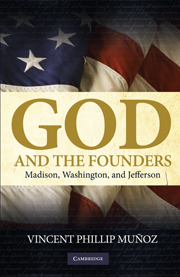Book contents
- Frontmatter
- Contents
- Acknowledgments
- Introduction: The Founders, Religious Freedom, and the First Amendment's Religion Clauses
- PART I THE FOUNDERS' CHURCH-STATE POLITICAL PHILOSOPHIES
- PART II THE FOUNDERS AND FIRST AMENDMENT RELIGION CLAUSES
- 4 Madison's, Washington's, and Jefferson's Church-State Doctrines
- 5 Madison, Washington, Jefferson, and the Establishment Clause
- 6 Madison, Washington, Jefferson, and the Free Exercise Clause
- 7 The Founders v. the Supreme Court
- Conclusion: The Founders and Church-State Jurisprudence
- Appendix A “Memorial and Remonstrance against Religious Assessments” by James Madison, 1785
- Appendix B A Bill “Establishing a Provision for Teachers of the Christian Religion” by Patrick Henry, 1784
- Appendix C A Bill for Establishing Religious Freedom in Virginia by Thomas Jefferson, 1777
- Index
6 - Madison, Washington, Jefferson, and the Free Exercise Clause
Published online by Cambridge University Press: 05 June 2012
- Frontmatter
- Contents
- Acknowledgments
- Introduction: The Founders, Religious Freedom, and the First Amendment's Religion Clauses
- PART I THE FOUNDERS' CHURCH-STATE POLITICAL PHILOSOPHIES
- PART II THE FOUNDERS AND FIRST AMENDMENT RELIGION CLAUSES
- 4 Madison's, Washington's, and Jefferson's Church-State Doctrines
- 5 Madison, Washington, Jefferson, and the Establishment Clause
- 6 Madison, Washington, Jefferson, and the Free Exercise Clause
- 7 The Founders v. the Supreme Court
- Conclusion: The Founders and Church-State Jurisprudence
- Appendix A “Memorial and Remonstrance against Religious Assessments” by James Madison, 1785
- Appendix B A Bill “Establishing a Provision for Teachers of the Christian Religion” by Patrick Henry, 1784
- Appendix C A Bill for Establishing Religious Freedom in Virginia by Thomas Jefferson, 1777
- Index
Summary
The previous chapter applied the Founders' legal doctrines to a sample of cases arising under the Establishment Clause. This chapter does the same for the Free Exercise Clause.
Similarly to Establishment Clause jurisprudence, no generally recognized taxonomy exists for Free Exercise cases. For the purposes of our analysis, free exercise cases can be grouped into three general categories:
Direct burdens on religious exercise.
Indirect burdens on religious exercise, including obligations of citizenship that conflict with religious precepts and state actions that disparately impact religious individuals or religious organizations.
Identification of religion for regulation or preferential exemptions.
Direct burden cases include the criminalization of religious practices as such and the imposition of civil disabilities on religious individuals on account of their religion or religious beliefs. They are distinguishable from indirect burden cases in that the former involve state actions that specify or target religion whereas the latter involve state actions that do not specify religion but incidentally affect it through generally applicable statutes or regulations. To make a Catholic mass illegal is an example of a direct burden; a generally applicable building code that limits the construction size of a new Catholic church is an indirect burden. Identification cases are similar to direct burden cases insofar as they involve state action that identifies religion; but, unlike direct burden cases, identification cases involve policies that use religion as a basis for regulatory classification or privilege.
- Type
- Chapter
- Information
- God and the FoundersMadison, Washington, and Jefferson, pp. 166 - 195Publisher: Cambridge University PressPrint publication year: 2009



